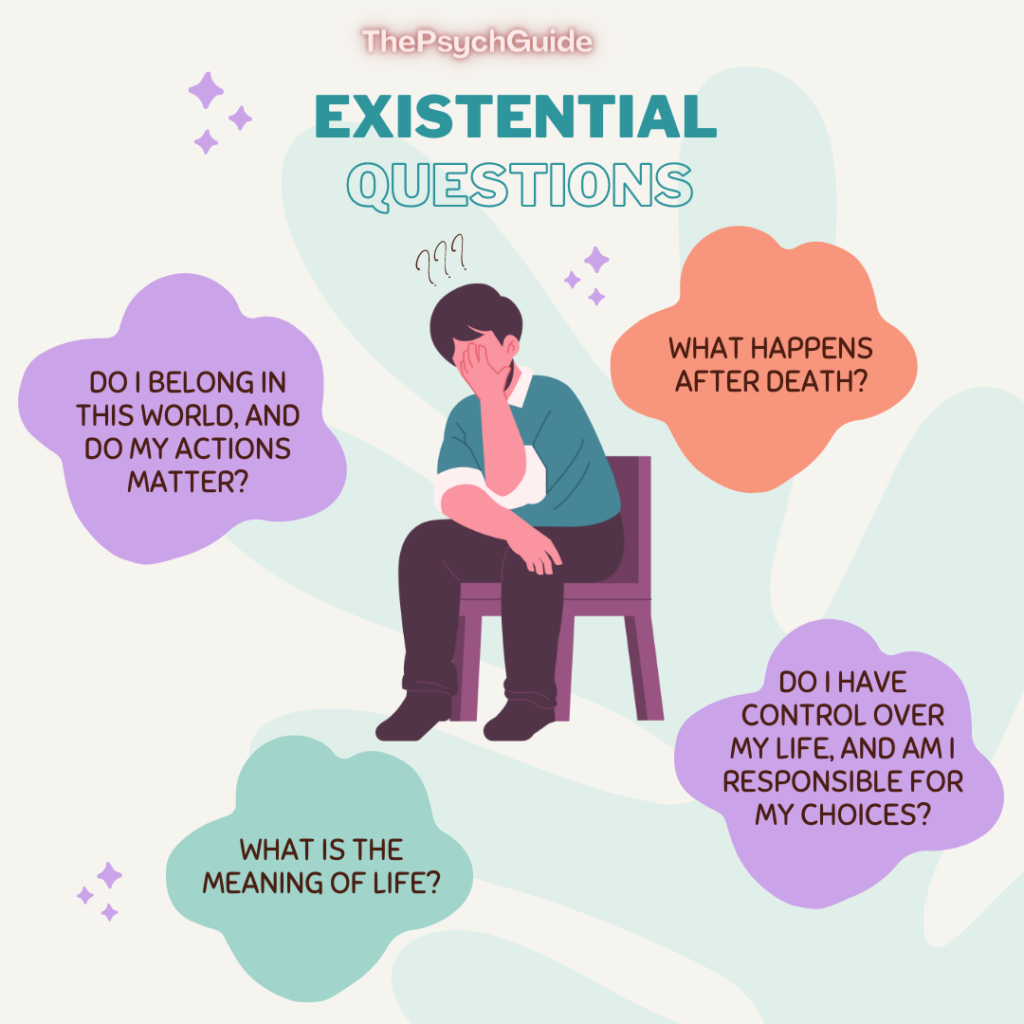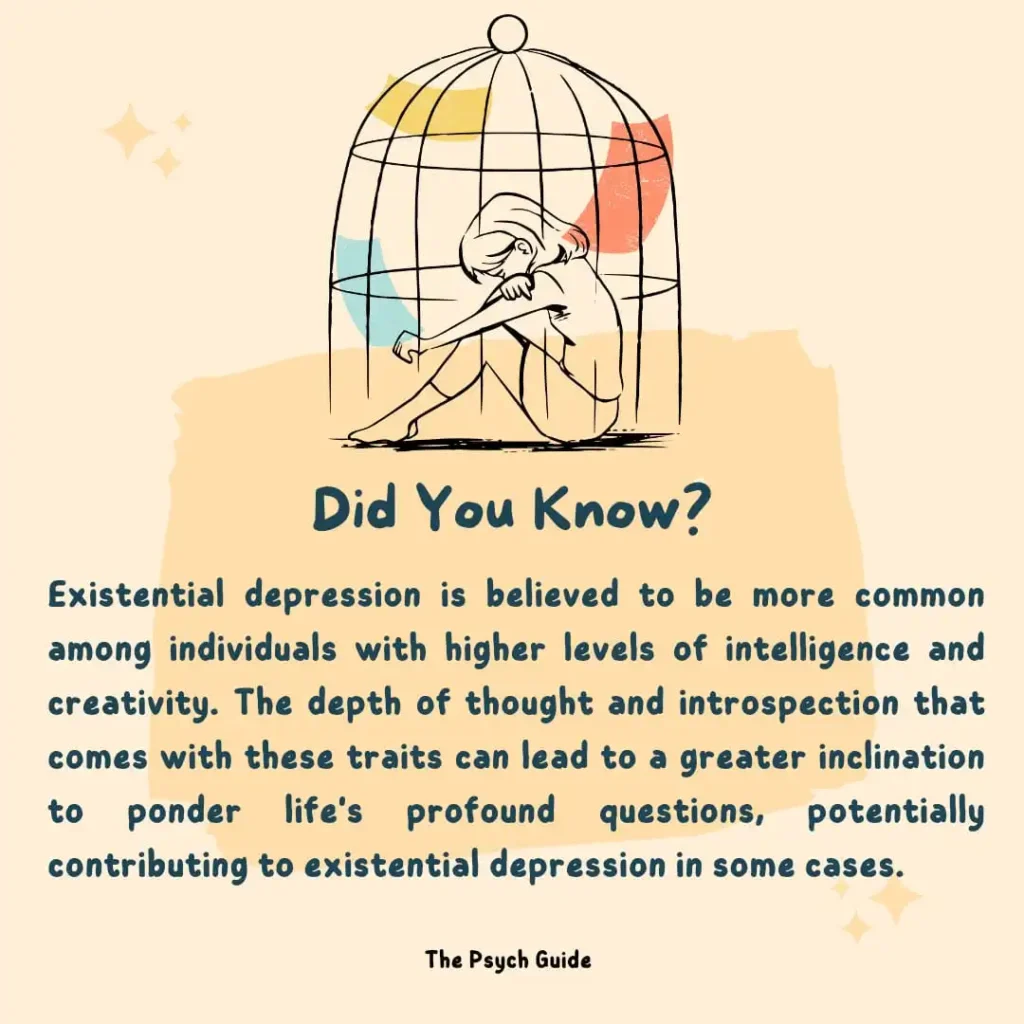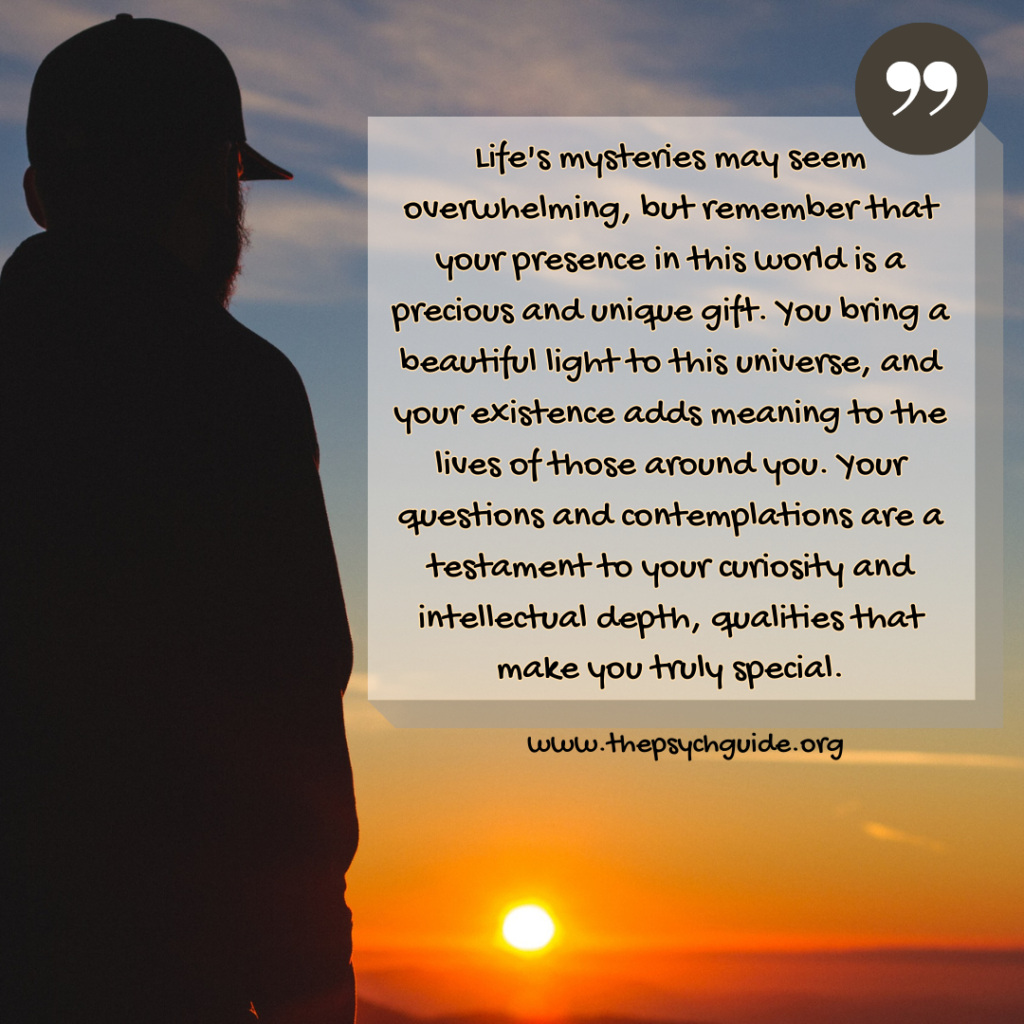Ever wondered why some people feel sad when they think about life’s major questions? Like, “What’s the point of life?” or “Why am I here?” Well, that feeling is called existential depression.
Symptoms of existential depression include losing sight of essential life purposes and beliefs, feeling guilty about past decisions and failures and becoming fixated on them, having a detached and powerless feeling, losing interest in once-enjoyed activities, losing one’s identity, and experiencing broken relationships frequently.
In this article, we will explore the symptoms of existential depression, shedding light on the emotional challenges people face when contemplating life’s deeper meanings. The thoughtful nature of this condition often leads to profound sadness and a sense of disconnection from the world, making it essential to recognize and address these symptoms of existential depression for improved well-being.
Table of Contents
ToggleKey takeaways!
Looking for Meaning: Existential depression is when you feel very deeply about finding the meaning and purpose of life beyond everyday things.
Feeling Sad and Hopeless: This depression can make you very sad and feel like there is no hope because you can’t find answers to big questions about life.
Worries about the World: It might make you feel hopeless about the future of the world and how society is doing.
Thinking About Death: You might think a lot about death or feel scared of it, or even think about hurting yourself.
Feeling Helpless and Not Interested: You might feel like you can’t change anything or find a purpose, and you lose interest in things you used to enjoy.
Life Isn’t Always Fair: You might realize that life is not always fair, and some things don’t seem right.
Wanting More from Life: You might want more excitement and meaning in life, not just the same routine.
Dealing with Relationships: You might feel disconnected from others because you think your relationships will end someday.
Changing Interests: You might not like the things you used to enjoy before because they don’t seem important now.
Feeling Unimportant: You might feel like nothing you do matters, so you wonder why you should even try.
Talking to Others: It can be hard to talk to people who don’t care about life’s major questions.
Trouble Making Decisions: It can be tough to make decisions because there are so many options and you feel overwhelmed.
Getting Help: Remember that it’s okay to feel this way, but it’s essential to talk to someone you trust or get help if it becomes too much to handle.
The 4 Fundamental Questions in Existential Depression.
Before we dive into the symptoms of existential depression let’s first talk about the key areas. Existential depression revolves around four fundamental questions that individuals often find themselves thinking about. These questions focus on deeper aspects of life and can turn on feelings of sadness and contemplation:

1. Meaning.
What is the meaning of life?
This question explores the purpose and significance of our existence. People may feel troubled when they struggle to find a clear answer or sense of direction in life.
2. Mortality.
What happens after death?
This question examines the nature of mortality and the afterlife. Pondering our mortality can bring feelings of anxiety and uncertainty about what lies beyond.
3. Freedom and Responsibility.
Do I have control over my life, and am I responsible for my choices?
This question reflects on the extent of our freedom and the consequences of our decisions. It can be both empowering and overwhelming to recognize the weight of personal responsibility.
4. Isolation and Connection.
Do I belong in this world, and do my actions matter?
This question addresses our sense of belonging and connection to others. People with existential depression may struggle with feelings of isolation and wonder if their actions have any significance in the grand scheme of things.
These four questions are deeply philosophical and can switch on existential crises in individuals. People may experience existential depression when they deal with these questions and find it challenging to find satisfying answers.
It’s important to remember that exploring these questions is a natural part of being human, but seeking support and understanding when you go through the symptoms of existential depression can help navigate the emotional complexities that arise from these contemplations.
Symptoms of Existential Depression.
Recognizing the symptoms of existential depression is of great importance, as it allows both individuals and their support networks to identify the nature of the emotional battles being faced. Unlike more traditional forms of depression, the symptoms of existential depression may not always manifest as noticeable signs of distress. Instead, they often present as subtle but persistent symptoms influencing thoughts, behaviors, and perceptions of the world.
1. Feeling very sad and hopeless because you can’t find answers to major questions about life:
The weight of unanswered existential questions can be emotionally overwhelming, leaving us feeling deeply sad and hopeless. When we confront the vastness of life’s mysteries without finding satisfactory answers, it can arouse feelings of helplessness and despair. It’s essential to recognize that seeking answers to such questions takes time and may not lead to definite conclusions. Finding comfort in the journey of questioning and embracing uncertainty can help alleviate this symptom of existential depression.
2. Feeling hopeless about the future of the world and society, in general, is a symptom of existential depression:
In an increasingly interconnected world, exposure to global challenges can kick into a sense of hopelessness about the future. Concerns about issues like climate change, social injustice, or political instability can create a pervasive feeling that positive change is unattainable. Coping with this hopelessness often involves finding solace in collective efforts, recognizing the power of individual actions, and engaging in activities that contribute positively to the community and the world.
3. Thinking a lot about death, dying, or even wanting to end your life:
It is the most prominent symptom of existential depression. Thoughts of mortality can become persistent during times of crisis, leading to a preoccupation with death or dying. It is crucial to recognize that such thoughts can be concerning and may require immediate attention and support. If someone experiences thoughts of self-harm or suicide, seeking professional help or confiding in someone they trust is of utmost importance for their safety and well-being.
4. Being scared of death:
This symptom of existential depression might sound strange but the fear of death is a common human experience. Contemplating the unknown and the idea of our mortality can evoke anxiety and uncertainty. It’s important to acknowledge and address these fears, understanding that they are a natural part of the human condition. Talking about these fears with others or seeking support can help alleviate some of the distress associated with them.
5. Feeling like you can’t change anything or find meaning in your life:
During an existential crisis, one may grapple with feelings of powerlessness and a lack of purpose. This sense of stagnation can be discouraging and may lead to feelings of apathy or disconnection. Rediscovering meaning often involves setting smaller, achievable goals, and taking incremental steps toward positive change. Each small accomplishment can contribute to a sense of agency and purpose.
6. Realizing that life is not always fair:
Such symptoms of existential depression are common. Confronting the reality of life’s inherent unfairness can be disheartening. It can challenge our belief in a just and equitable world. While we may not be able to control all circumstances, recognizing the importance of empathy, compassion, and advocacy for social justice can provide a sense of direction and purpose amidst life’s inequities.
7. Wanting more from life than just everyday routines that feel boring and unimportant:
Yearning for a deeper and more fulfilling existence is a natural response to monotony and routine. Seeking novelty, personal growth, and meaningful experiences can infuse life with excitement and purpose. Embracing curiosity and exploring new interests can help break free from the cycle of mundane everyday routines.
8. Feeling disconnected from people because you believe your relationships will eventually come to an end:
The impermanence of relationships can be challenging to accept, leading to a sense of emotional detachment. However, acknowledging the value of connections and the meaningful experiences shared with others, even in temporary relationships, can help foster a sense of appreciation for each interaction.
9. Losing interest in things you used to enjoy because they don’t seem important or meaningful anymore:
Experiencing a shift in interests or hobbies can be disconcerting, especially when things that once brought joy lose their appeal. Understanding that personal growth often entails evolving interests and embracing change can help ease feelings of loss and uncertainty.
10. Believing that nothing you do matters, so you wonder why you should even bother trying:
Feeling like our actions lack significance is a common struggle during an existential crisis. Cultivating self-compassion and recognizing the impact of even small acts of kindness and contribution can gradually restore a sense of purpose and meaning.
11. Having trouble talking to people who don’t seem to care about major questions about life:
Engaging in conversations with others who don’t share the same interest in existential questions can be challenging. Practicing open-mindedness and respecting differing viewpoints can foster more meaningful interactions, even if not all conversations delve into profound matters.
Is existential depression found in gifted people?
Some researchers and psychologists have observed that symptoms of existential depression tend to be more prevalent among certain groups, including gifted and talented individuals. This phenomenon is often associated with the following groups:
Artists and Other Creative Individuals:

Many artists, writers, musicians, and other creative people have a deep sensitivity to the world around them. They may be more thoughtful and reflective, which can lead to a heightened awareness of existential questions and concerns.
Scientists:
Scientists, especially those in fields like astrophysics, cosmology, and philosophy, often delve into profound questions about the nature of the universe, its existence, and human consciousness. This exploration can evoke existential contemplation and, in some cases, existential depression.
Intellectuals:
Intellectuals, who tend to be deep thinkers and ponder complex ideas, may also be more susceptible to existential depression. Their constant engagement with abstract concepts and philosophical inquiries can lead them to confront existential questions on a deeper level.
Highly Sensitive People:
Highly sensitive individuals are more emotionally tuned to their surroundings and the experiences of others. This heightened sensitivity can lead them to reflect deeply on the human condition and the meaning of life, making them more prone to experiencing the symptoms of existential depression.
It’s essential to note that not all gifted or talented individuals experience existential depression, and not everyone with existential depression falls into these groups. Existential depression is a complex and multifaceted phenomenon that can affect people from all walks of life. Additionally, being gifted or talented does not automatically lead to experiencing existential depression. Each individual’s experience is unique, and various factors can contribute to the development of existential concerns and emotional struggles.
Coping with Existential Depression.
The coping tips provided below are meant to help individuals who are experiencing existential questions and distress associated with existential depression. Here’s an explanation of each coping tip:
Create Your Meaning:
This coping tip suggests that individuals can find a sense of purpose and fulfillment by taking meaningful actions and making choices that matter to them. Even though we can’t control everything that happens in life, we can still make positive changes, big or small, that give our life meaning and direction. For example, expressing love and appreciation to loved ones, helping others, and aligning our choices with personal values can add purpose to our lives.
Share Your Feelings:
This tip encourages individuals to talk to people they trust, such as friends or family, about their emotional struggles and existential questions. Sharing feelings with others can provide comfort and support. People who care about you can remind you of the positive impact you have on their lives, which can help add meaning and value to your own life.
Embrace Growth:
The idea behind this coping tip is that experiencing uncertainty and emotional struggles can be a natural part of personal growth and development. Instead of seeing these feelings as something “wrong” with you, it’s possible to view them as opportunities for growth and self-awareness. Going through existential depression can lead to a deeper understanding of yourself and greater self-acceptance.
Stay in Present:
Practicing mindfulness is a way to stay focused on the present moment, rather than dwelling on the past or worrying about the future. By being mindful and aware of the present, you can recognize the positive aspects of your life and find meaning in the here and now. This can help shift your attention away from negative thoughts and uncertainties, allowing you to focus on what you can control at the present moment.

Top 3 books that will help you cope with existential depression.
While coping with existential depression can be a challenging journey, reading books that explore existential themes and offer valuable insights can be comforting and enlightening. Here are three top book recommendations that can help you navigate existential questions and find solace:
“Man’s Search for Meaning” by Viktor E. Frankl:
This book is a powerful memoir and psychological exploration by Viktor Frankl, a Holocaust survivor and psychiatrist. He shares his experiences in concentration camps and discusses his theory of logotherapy, which centers on finding meaning and purpose in life even in the most challenging circumstances. “Man’s Search for Meaning” offers profound insights into the human capacity for resilience and finding meaning in life, even in the face of extreme suffering.
“The Myth of Sisyphus” by Albert Camus:
In this philosophical essay, Albert Camus delves into the concept of the absurd, questioning the meaning of life in an indifferent and seemingly irrational universe. He uses the myth of Sisyphus, condemned to push a rock up a hill for eternity, as a metaphor for the human struggle. Camus explores the idea of embracing the absurdity of existence and finding personal freedom and fulfillment in acknowledging life’s uncertainties.
“The Power of Now: A Guide to Spiritual Enlightenment” by Eckhart Tolle:
While not explicitly focused on existential depression, this book offers profound insights into mindfulness and living in the present moment. Eckhart Tolle discusses how dwelling on the past or anxiously anticipating the future can lead to emotional suffering. By cultivating mindfulness and embracing the present, individuals can find peace and meaning in their lives.
Treatment of existential depression.
When you experience distress because you are unable to comprehend the mysteries of life, existential sadness tends to endure and worsen. Psychotherapy can help to ease the unresolved and unprocessed life events and emotions that might cause an existential crisis. Several psychotherapy modalities might be useful for the particular difficulties of existential depression.
A treatment strategy known as logotherapy focuses on achieving life’s purpose despite one’s circumstances. It highlights how, despite challenging life situations, people can grow and find purpose in their own lives.
Existential therapy is a more flexible form of therapy that places more emphasis on breaking down your previous experiences than on dwelling on them to find meaning and purpose. You can break free from life with the aid of existential therapy.
Read a detailed article on the treatment of depression.
Causes of existential depression.
Existential depression can happen for different reasons, and it’s not always straightforward. Here are some common causes:
Deep Questions: Thinking deeply about life’s meaning and existence can lead to this kind of depression. Wondering about why we’re here or what happens after we die can make us sad and confused.
Loss or Sad Events: Feeling this way can also come from experiencing something sad or losing someone important to us.
Personal Struggles: Going through hard times in life or feeling like we don’t fit in can make us question our purpose.
Caring Too Much: Being very sensitive and caring a lot about the world and others can also contribute to this depression.
Feeling Alone: Thinking about these things can make us feel disconnected from others who don’t understand.
Thinking Too Much: Sometimes, being very smart and overthinking things can play a role.
Spiritual Questions: Feeling lost in our beliefs or faith can lead to this type of depression.
Not Feeling Fulfilled: Even if we achieve things, we might still feel empty inside and wonder why.
Remember, it’s normal to have questions about life, but if these feelings become too much, it’s essential to talk to someone you trust or seek help from a professional. They can support you through these tough times.
What is the difference between Existential Dread and Existential Depression?
Existential depression and existential dread go hand in hand. However, not everyone experiences existential depression, even if the majority of individuals may feel existential dread at some time in their lives.
Existential dread is a prevalent emotion. Most people probably experience life’s mysteries-related overwhelm at some point. The fact that queries like “What is the point of life?” and “Why do bad things happen?” Having no definitive answers is not uncommon.
Many people may have difficulties in life that make them doubt who they are and what they believe. A person may begin to doubt their life’s principles after experiencing tragedy such as the loss of a loved one, the diagnosis of a disease, the end of a relationship, or any other sort of trauma. But existential dread often dissipates with time, and people can typically cope with it with reflection and help from others.
Existential depression is when you feel very sad and confused about the meaning of life. You might ask deep questions like why we exist or what happens after we die. This can make you feel hopeless and disconnected from everyday life. It’s challenging but important to find ways to cope with these feelings and search for meaning. Talking to someone you trust or a mental health professional can be helpful during this time.
Is existential depression a real Disorder?
The Diagnostic and Statistical Manual of Mental Disorders (DSM) and the International Classification of Diseases (ICD) don’t define existential depression as a separate known condition. Instead, it is seen as a phrase used to express a condition of mental discomfort and existential doubt about the meaning and purpose of existence.
People suffering with existential depression may exhibit symptoms comparable to those experienced by other sorts of depression, including emptiness, meaninglessness, and despair. If a person’s distress approaches the threshold for an official diagnosis of depression, they may be diagnosed with major depressive disorder (MDD) or another depressive illness.
It is crucial to highlight that the evaluation and recognition of mental health disorders are normally performed by certified mental health experts such as psychiatrists or clinical psychologists. If somebody is experiencing existential issues or other forms of emotional distress, receiving assistance from an expert in mental health is important for proper evaluation, suitable encouragement, and individualized therapy.
FAQS
Are existential crises and existential depression the same?
Understanding existential crises is when someone starts thinking a lot about the big questions in life, like what life is all about and why they exist. It’s like a time of deep reflection and uncertainty about their purpose and identity.
Existential depression, on the other hand, is a kind of sadness that comes from dealing with these big questions. When people feel overwhelmed by not knowing the meaning of life or feel disconnected from others, it can lead to this type of depression.
So, an existential crisis is about asking big questions, and existential depression is the feeling of sadness that can come from trying to find answers to those questions.
How to embrace existential uncertainty?
Embracing existential uncertainty means accepting that there are things we don’t know about life and feeling okay about it. To do this, try being in the present moment, being curious about new things, and not stressing over having all the answers. It’s essential to let go of worries and negative thoughts about uncertainty.
Talk to others who have gone through similar experiences to gain different perspectives and focus on what you can do right now rather than worrying too much about the future. Remember, it’s okay not to have everything figured out.
Find meaning in the journey, build your ability to bounce back from challenges, and be kind to yourself during uncertain times. Don’t hesitate to seek support from family, friends, or someone you trust. As you go through this process, you may discover personal growth and a more fulfilling life.
How to deal with purposelessness?
Dealing with purposelessness can be challenging, but there are strategies to overcome it. Explore your interests and set meaningful goals aligned with your values. Volunteering and helping others can bring a sense of purpose, while mindfulness practices can provide peace and acceptance.
Seek support from friends, family, or a mental health professional to share your feelings and gain insights. Embrace change, focus on small achievements, and engage in self-reflection to understand what truly matters to you.
Avoid comparing yourself to others and remember that it’s okay to seek professional help if needed. Be patient and take small steps toward finding meaning and fulfillment in your life’s journey.
What are some steps to discover meaning in life?
- Reflect on your values, strengths, and interests to gain insights into what matters most to you.
- Set meaningful goals that align with your values and aspirations, giving your life direction and purpose.
- Engage in activities that bring you joy and fulfillment, whether it’s pursuing a hobby, volunteering, or helping others.
- Cultivate positive relationships with people who support and uplift you, adding depth and purpose to your life.
- Embrace challenges as opportunities for growth and personal development.
- Find meaning in small moments and appreciate the simple pleasures in life.
- Practice gratitude to shift your perspective and cultivate contentment.
- Extend acts of kindness and compassion towards others, which can bring profound meaning to your life.
- Live in alignment with your core values, making choices that reflect your beliefs and principles.
- Be patient and open-minded, allowing the process of finding meaning to unfold naturally over time.
How to address existential anxiety?
Addressing existential anxiety means dealing with worries and fears that come when you think about life’s meaning and uncertainties. You can manage this anxiety by being mindful, focusing on the present, and getting help from others.
How to manage existential isolation?
Managing existential isolation is about handling feelings of loneliness or disconnection that can happen when you think deeply about life. You can manage this by making meaningful connections with people, doing social activities, and getting support from loved ones.
What is the philosophy of existential depression?
The Philosophy of existential depression means exploring the ideas behind this kind of depression, which often comes from feeling purposeless and questioning life. Understanding these ideas can help you find ways to cope and get support.
How to find hope in existential despair?
Finding hope in existential despair means finding positive things and strength when you feel hopeless and down. You can find hope by being positive, getting professional help, and finding meaning in challenges.
Wrapping up!
In conclusion, recognizing and understanding the symptoms of existential depression is essential in providing support and empathy to those grappling with these profound emotional experiences. Individuals who face existential questions and uncertainties should know that they are not alone in their journey. By acknowledging the unique challenges posed by existential depression, we can foster a compassionate and nurturing environment for those seeking meaning and purpose in life.
Moreover, it is crucial to remember that existential depression is a natural part of the human experience, and it can affect people from all walks of life. It is not limited to specific groups or backgrounds. While the symptoms of existential depression may be distressing, they can also lead to personal growth, self-awareness, and a deeper understanding of one’s values and beliefs.

